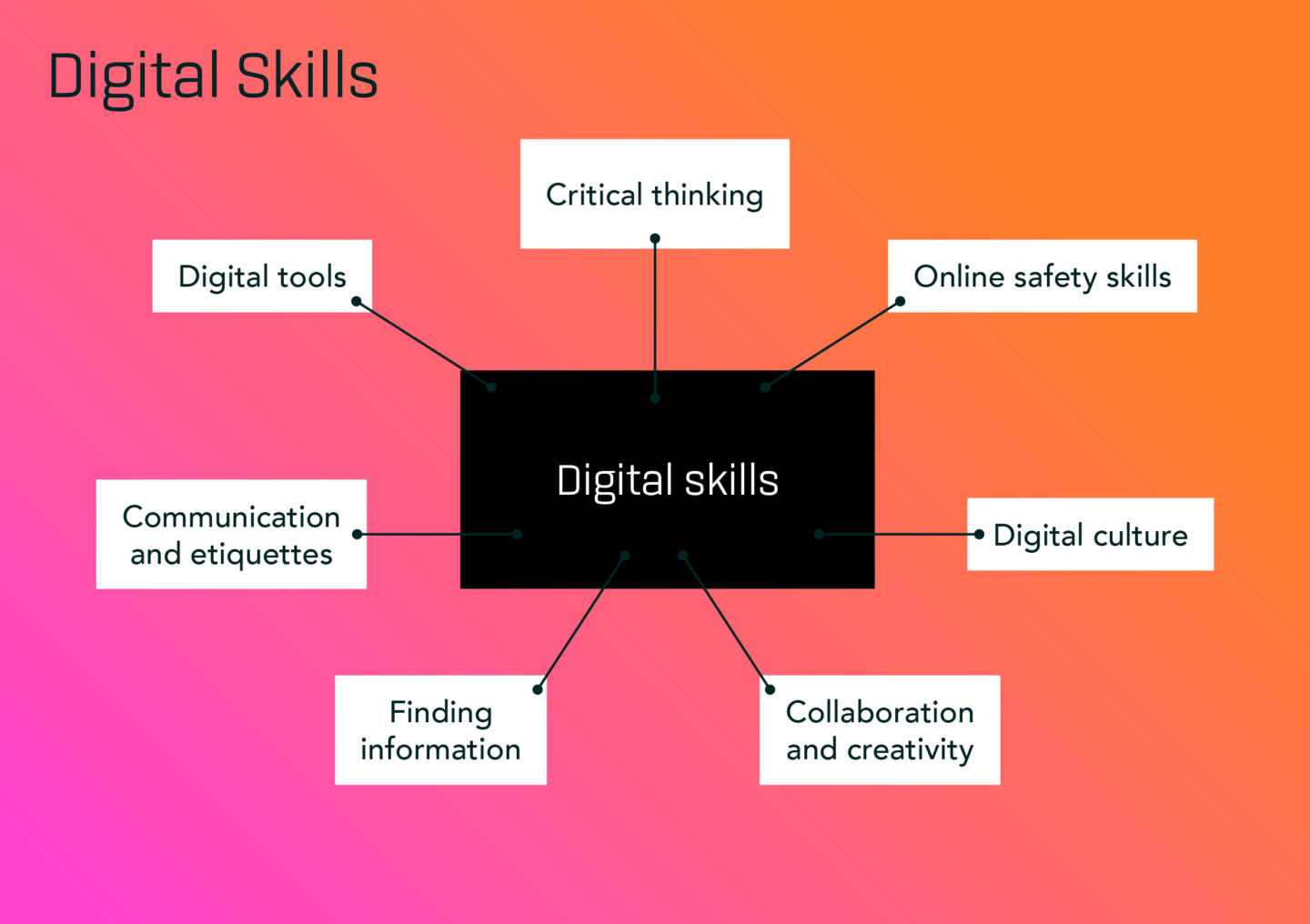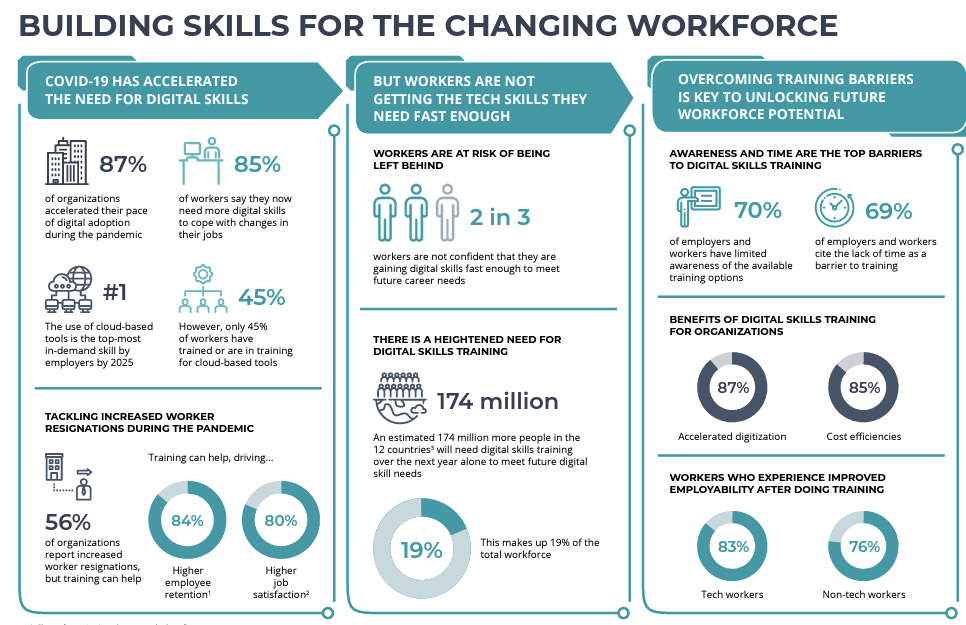Governance
Enhancing Digital Skills
- 24 Mar 2022
- 7 min read
For Prelims: Digital Skills, Covid-19 pandemic, cybersecurity, machine learning, DigiSaksham initiative
For Mains: Need to enhance Digital Skills and related Initiatives, Issues related to enhancing Digital Skills
Why in News?
According to a new report, about 27.3 million workers, representing 7% of the country’s workforce, will require digital skills training for their jobs over the next year.
- The report named ‘Building Digital Skills for the Changing workforce’ has been prepared by AlphaBeta and commissioned by Amazon Web Services, Inc (AWS), an Amazon.com company.
- The need for more advanced cloud computing skills, including machine learning and cloud architecture design have emerged as the fifth and sixth most in demand digital skills by employers in India by 2025.
What are Digital Skills?
- Digital skills are broadly defined as the skills needed to “use digital devices, communication applications, and networks to access and manage information,” from basic online searching and emailing to specialist programming and development.
- Digital skill is not equal to education in the classic STEM (Science, technology, engineering and mathematics) disciplines.
What are the issues related to Digital Skilling?
- Insufficient Capacity: Current infrastructure facilities available in the educational institutions throughout the country are inadequate considering the huge demand for skilled labour as there are not many trained and highly skilled trainers available.
- Mobilisation: The outlook of people associated with skill development is still very traditional and the enrolment of the students for vocational education and training has become an extremely challenging task.
- Scalability: Any model to be successful needs a lot of support from different stakeholders. Since there is limited buy-in from the corporate sector, the progress of such initiatives is slow.
- Skills Mismatch: There is lack of industry-faculty interaction because of which the skill sets provided by the educational and training institutes do not end up suiting the employers’ requirements. As a result, though the people may be skilled but they do not get employment.
- Barrier to Digital Skilling: According to the report named ‘Building Digital Skills for the Changing workforce’, lack of time to pursue training was the most commonly faced barrier to digital skilling.
- Other reasons include limited awareness of training options, low training quality and high training costs.
What are the Related Initiatives?
- DigiSaksham initiative
- YuWaah Platform
- IndiaSkills 2021
- Pradhan Mantri Kaushal Vikas Yojana (PMKVY)
- Recognition of Prior Learning
- National Career Service Project
- Skills Acquisition and Knowledge Awareness for Livelihood (SANKALP)
- Young, Upcoming and Versatile Authors’ (YUVA) scheme
- Kaushalacharya Awards
- Scheme for Higher Education Youth in Apprenticeship and Skills (SHREYAS)
- Atmanirbhar Skilled Employee Employer Mapping (ASEEM)
- Skill Certification
- National Skills Qualification Framework (NSQF)’
Way Forward
- There is an urgent need for the governments to work together with employers, training providers, and workers to meet these diverse and growing digital learning needs
- Skilling at scale must be a national priority and become India’s competitive edge to enable the country to grow as the global powerhouse for developing technological talen.
- To thrive in a digital future, new formats of skilling programmes on emerging technologies must be built and delivered at a massive scale.
- Since, India has a huge ‘demographic dividend’ which means that it has a very high scope of providing skilled manpower to the labour market, so the need of the hour is to put coordinated effort from all stakeholders.
- To strengthen the skill ecosystem, the need is to break down traditional barriers and be open to learning while earning, learning with flexible delivery and aligning it with qualification modularity.
UPSC Civil Services Examination, Previous Year Questions (PYQs)
Q. To obtain full benefits of demographic dividend, what should India do? (2013)
(a) Promoting skill development
(b) Introducing more social security schemes
(c) Reducing infant mortality rate
(d) Privatisation of higher education
Ans: (a)
Q. With reference to Pradhan Mantri Kaushal Vikas Yojana, consider the following statements: (2018)
- It is the flagship scheme of the Ministry of Labour and Employment.
- It, among other things, will also impart training in soft skills, entrepreneurship, financial and digital literacy.
- It aims to align the competencies of the unregulated workforce of the country to the National Skill Qualification Framework.
Which of the statements given above is/are correct?
(a) 1 and 3 only
(b) 2 only
(c) 2 and 3 only
(d) 1, 2 and 3
Ans: (c)
Q. With reference to ‘National Skills Qualification Framework (NSQF)’, which of the statements given below is/are correct? (2017)
- Under NSQF, a learner can acquire the certification for competency only through formal learning.
- An outcome expected from the implementation of NSQF is the mobility between vocational and general education.
Select the correct answer using the code given below:
(a) 1 only
(b) 2 only
(c) Both 1 and 2
(d) Neither 1 nor 2
Ans: (b)
Q. ‘Recognition of Prior Learning Scheme’ is sometimes mentioned in the news with reference to (2017)
(a) Certifying the skills acquired by construction workers through traditional channels.
(b) Enrolling the persons in Universities for distance learning programmes.
(c) Reserving some skilled jobs to rural and urban poor in some public sector undertakings.
(d) Certifying the skills acquired by trainees under the National Skill Development Programme.
Ans: (a)






